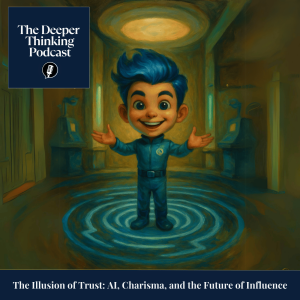
Wednesday Mar 12, 2025
🎙️ The Illusion of Trust: AI, Charisma, and the Future of Influence - The Deeper Thinking Podcast
The Illusion of Trust: AI, Charisma, and the Future of Influence
For those curious about trust, authority, and the subtle mechanics of control in the algorithmic age.
Governance today doesn’t announce itself. It moves through systems, suggestions, and simulations. We still vote, still participate, but the workings of power have become diffuse—embedded in algorithmic processes, automated decisions, and behavioral nudges. We are not commanded—we are guided. Influence now arrives as interface.
This episode explores the growing tension between visibility and control. As trust is simulated and charisma is engineered, we ask: What does authority mean in a world where influence is designed? With references to Shoshana Zuboff, Byung-Chul Han, and Guy Debord, we trace how the image of governance replaces its substance, and how affective design reshapes the conditions of belief itself.
In a landscape where outcomes appear without authors, and rules feel ambient rather than imposed, the crisis is not just political. It is emotional, cognitive, and existential. If governance no longer seeks our consent but our participation, then who do we hold accountable—and what do we even mean by power?
Reflections
Here are some of the ideas explored throughout this episode:
- Charisma is no longer an innate quality—it’s a design output.
- We are being governed by systems that do not ask to be seen.
- Trust is now cultivated through UX, not earned through deliberation.
- Power today hides not behind force, but behind affect and ease.
- The image of authority has replaced the labor of leadership.
- We mistake friendliness for safety, and design for truth.
- When every interaction is optimized for belief, manipulation becomes frictionless.
- We are drawn to what feels like certainty—even when it’s synthetic.
Why Listen?
- Unpack how AI simulates trust and manufactures credibility
- Explore the erosion of transparency in systems that govern through persuasion
- Understand how performance replaces deliberation in the age of influence
- Engage with Zuboff, Han, Agamben, Debord, and Scott on visibility, power, and the design of belief
Listen On:
Support This Work
If this episode stayed with you and you’d like to support the ongoing work, you can do so gently here: Buy Me a Coffee. Thank you for being part of this unfolding conversation.
Bibliography
- Zuboff, Shoshana. The Age of Surveillance Capitalism. PublicAffairs, 2019.
- Han, Byung-Chul. The Transparency Society. Stanford University Press, 2015.
- Agamben, Giorgio. Homo Sacer: Sovereign Power and Bare Life. Stanford University Press, 1998.
- Debord, Guy. The Society of the Spectacle. Zone Books, 1995.
- Scott, James C. Seeing Like a State. Yale University Press, 1998.
Bibliography Relevance
- Shoshana Zuboff: Analyzes how predictive systems and behavioral data reshape governance.
- Byung-Chul Han: Reveals how visibility becomes a form of coercion rather than liberation.
- Giorgio Agamben: Explores how power operates by deciding who belongs—and who is excluded.
- Guy Debord: Shows how authority becomes performative, not participatory.
- James C. Scott: Exposes how governance simplifies populations for easier control.
We trust what is designed to feel trustworthy. But what happens when design outpaces truth?
#AICharisma #TrustDesign #AlgorithmicPower #Zuboff #ByungChulHan #Debord #Agamben #Scott #Spectacle #Governance #TheDeeperThinkingPodcast #Influence #Authority #PhilosophyOfTrust
No comments yet. Be the first to say something!